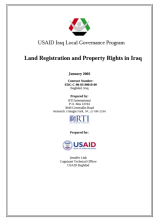Land Library Search
Through our robust search engine, you can search for any item of the over 73,000 highly curated resources in the Land Library.
If you would like to find an overview of what is possible, feel free to peruse the Search Guide.
/ library resources
Showing items 1 through 9 of 181."This paper explores the puzzle of why the pastoral Maasai of Kajiado, Kenya, supported the individualization of their collectively held group ranches, an outcome that is inconsistent with theoretical expectation.
Land registration and property rights in Iraq have deep historical foundations reaching back to the Hammurabic period. However, the current land registration system owes more to the 400-year Ottoman occupation of Iraq and the subsequent interval under the British mandate.
Quels enseignements peut-on tirer des expériences de mise en œuvre des Plans fonciers ruraux dans la perspective de la formulation de politiques et de législations foncières adaptées en Afrique de l’Ouest et d’amélioration des stratégies de sécurisation foncière des droits des producteurs
This document takes a historical view of the relations between individual and collective actors in local water management in the Mekong Delta in southern Vietnam.
Since the early 1990s, the dominant consensus in the debate on land rights reform in sub-Saharan Africa has been that external interventions to privatise land rights are usually inappropriate and likely to remain so.
What are the dynamics of land tenure in the CAS (Conda, Ambuim, and Sumbe) area in Angola? What are its opportunities and risks? This paper reveals a denial of land access rights to communal farmers, whose livelihoods are centred on land.
Land degradation is a severe problem across sub-Saharan Africa, and Ethiopia is among the most affected countries.
With land being the main source of income for many people in the developing world, security of access or ownership rights is imperative to the alleviation of rural povety.
This document investigates the concept of land reform in South Africa and argues that there is a need to redefine 'land reform' to take account of the realities of an urbanising, modernising, economy.



